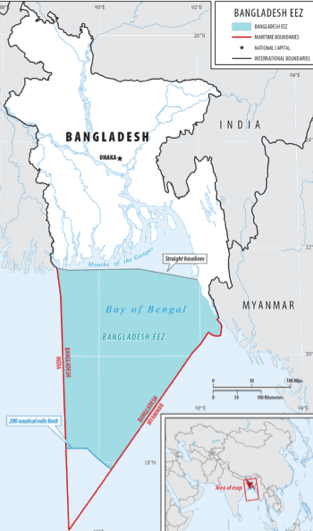Journal of Ocean and Coastal Economics
Volume 6, Issue 2 (2019) Special Issue on the Blue Economy of Bangladesh
Editor in Chief's Introduction
This special issue of the Journal of Ocean & Coastal Economics represents a departure from the journal’s usual practice of publishing individual papers presenting a variety of explorations of the application of the theory and methods of economics to problems of oceans and coasts. This edition focuses on the blue economy, a term that has rapidly spread around the world to become one of the most dominant terms used to describe ocean related policies at that international, national, and regional levels. The term is still flexible in definition, and its manifestation can be very different from place to place because of the great variety of economic and ecological characteristics in the seas and oceans. This issue focuses on the blue economy of Bangladesh, a developing country with a highly complex relationship to the sea owing to its extensive coastline and one of the world’s largest estuary systems. The papers in this issue were prepared and reviewed as part of a joint project led by The World Bank, the European Union, and the Government of Bangladesh. The guest editors for the issue, Pawan Patil, Pierre Failler, and Khurshed Alam represented, respectively, the Bank, the E.U. and the Government of Bangladesh in organizing the project and the papers. The papers in this issue discuss both economic and ecological issues affecting the blue economy, and also explore policy structures that may affect the blue economy. As such, these papers extend somewhat beyond the boundaries of economics normally covered in the journal. But the conceptual boundaries of the blue economy are still being determined and are likely to be highly permeable across disciplines, bodies of knowledge, and professional viewpoints. While we hope that each of the papers in this issue makes a contribution in its own area, it is in seeing the challenges across the range of perspectives that the blue economy of Bangladesh and other countries can begin to be understood.Research Articles
Initial Measures of the Economic Activity Linked to Bangladesh’s Ocean Space, and Implications for the Country’s Blue Economy Policy Objectives
Pawan G. Patil, John Virdin, Charles S. Colgan, M Gulam Hussain, Pierre Failler, and Tibor Veigh
Future Importance of Maritime Activities in Bangladesh
M Gulam Hussain, Pierre Failler, and Subrata Sarker
Future importance of healthy oceans: Ecosystem functions and biodiversity, marine pollution, carbon sequestration, ecosystem goods and services
Mohammad Mosharraf Hossain
Coming Stakes in the Ocean: Food Production, Shipping and Trade, Tourism, Ecosystem-biodiversity, New Technologies and Climate Change Challenges in Bangladesh
Muhammad Abdur Rouf, Md. Moshiur Rahman, Sk Mustafizur Rahman, and Md Nazmul Ahsan
Blue Economy and Climate Change: Bangladesh Perspective
Subrata Sarker, Firdaus Ara Hussain, Mohammad Assaduzzaman, and Pierre Failler
Augmenting Marine Food Production Through Fisheries Management and Mariculture
S M. Sharifuzzaman, M I. Golder, and M. Shahadat Hossain
Blue Biotechnology, Renewable Energy, Unconventional Resources and Products as Emerging Frontiers at Sea
Sheikh Aftab Uddin and Mohammad Mahmudul Islam
Ship Breaking and its Future in Bangladesh
Jewel Das and Muhammed Ali Shahin
Institutional Arrangements for the Blue Economy: Marine Spatial Planning a Way Forward
Daud Hassan and Md. Ashraful Alam Ashraf
Coastal and Marine Tourism in the Future
Mohammad Nur Nobi and Md. Alauddin Majumder
Policy Interventions for the Development of the Blue Economy in Bangladesh
Pierre Failler, M Gulam Hussain, Khurshed Alam, and Ahmad Al Karim
Special Content
Introduction to the Special Issue on the Blue Economy of Bangladesh
Pawan G. Patil, Pierre Failler, and Khurshed Alam
